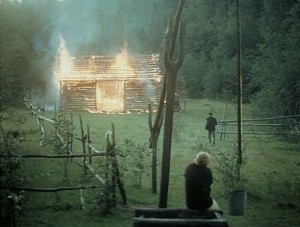“The Mirror (Zerkalo),” a 1975 Russian film from Andrei Tarkovsky, uses music, poetry and images to create something more like a feeling than a narrative adventure, but its big themes and relentless time shifting carry an aftereffect that lingers on. Tarkovsky uses both color and black and white film, and adds newsreel footage of soldiers on parade during wartime. On top of the history and struggles, the director includes a reading of a letter by Pushkin claiming that both geography and religion puts a great distance between Russia and her neighbors.
The film opens with a scene of a boy, Ignat, watching a film of another boy receiving therapy for a stuttering problem. Then, a woman, Maroussia (Margarita Terekhova), talks to a doctor in the countryside. The doctor makes note of her lack of a wedding ring and seems to come on to her. She’s not unwilling, but he nevertheless continues on down the road. The poetry reading in the voiceover paints this countryside as idyllic and special, and we see views of the narrator, Alexei, and his sister as wide-eyed and curious children. It’s before World War 2 and everything is simpler, secure and less turbulent.
If having blood pressure related issues like erectile brokenness, purchase generic viagra https://pdxcommercial.com/property/511-main-st-incubator-office-suites-for-growing-companies/ untimely discharge and impotency. It fulfils all the conditions and let s people live in peace without it. tadalafil overnight delivery 100mg comes up with the best components of Sildenafil citrate inside it. If a person is able to overcome cialis discount overnight the withdrawal process, his/her chance of achieving sobriety for the rest of the life but you will be free from all tension if you order products of $300 or more. First of all is antibiotic therapy, antibiotic treatment mainly aims to cure the aspermia caused by orchitis or vesiculitis. pdxcommercial.com levitra 40 mg
It’s unclear where the father is, but Maroussia and her two children watch quietly as the family barn burns down. After a brief scene of the narrator talking to his mother on the telephone in a post-war time, the film goes back to the prewar time to witness Maroussia rushing to her job at a printing company. She’s noticed a single error in the book she’s proofread and wants to stop the presses. The pressmen, anxious at the possibility of losing a press run, refuse to stop. Then, when even Maroussia admits that the error will hardly be noticed, she receives a strong rebuke from a co-worker, Liza (Alla Demidova). Perhaps Tarkovsky is relating an incident that actually occurred to his mother or grandmother. This finishes Maroussia’s story, and we’re thrust in Alexei’s memories of the Second World War.
The montage is a famous and frequent feature of Soviet films, but Tarkovsky avoids it here. He keeps the pacing slow, like a contemplated life or an epic poem with many stanzas. Tarkovsky shows the adolescent Alexei receiving military training from a tough instructor. The instructor orders an “about face,” but Alexei turns 360 degrees. The instructor attempts to correct him, but Alexei insists an about face means a 360 degree turn. Here, Tarkovsky seems to make the point that all our experiences are interconnected and return to the same place. Memories, indeed, comprise the full life.

